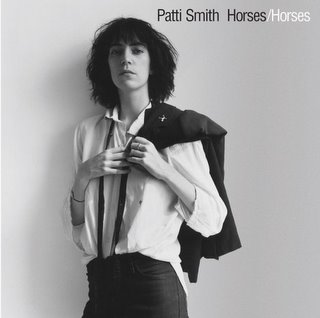

 |
 |
 |
This Week's
|
Friday, December 02, 2005
Oy, Mate
No better way to start this than by posting the first paragraph from this article in today's Guardian: It will be the biggest sports event in German history. But yesterday it emerged that the lavish opening ceremony for next year's World Cup will be almost entirely devised by British artists - including Peter Gabriel and Brian Eno. Gabriel, who co-founded Genesis, is to be the musical director of the show in Berlin which will kick off the month-long tournament. Now, I am looking forward to next year's World Cup as much as anyone I know, and I posted here about Eno recently, and I expected at some point to write about the tension between commercial success and selling out, but never did I expect to read the word's "Gabriel" and "Eno" and "World Cup" in the same sentence. Eno, btw, according to the first sentence of the next paragraph, is "composing a 2006 World Cup anthem." "Sven Goren Erickson's On Fire" (which he will be when England crash out in table play*)?" "Blank Frank" Lampard? What amazes me is that the whole concept of selling out has been as devalued as once the music of someone branded a sell-out once was. I remember the furious eschatological angst over Eric Clapton's decision to do Michelob commercials, not whether he was a sell-out for signing (all agreed he was) but whether he needed to be dedeified for violation of sacred code. Hopelessly romantic and dramatic and naive and solipsistic, I know, but real. What's remarkable is not only that selling-out is not a concern for today's rocksters, not not selling out is. Death Cab for Cutie scores an appearance on "The O.C," Delays first single becomes the background music of a diamond company's Christmas commercial last year, The Postal Service is sued by the US Postal Service over brand infringement, wins in court the right to the name, and then is hired by the USPS to provide music for their commercials. Eric Clapton, of course, didn't have to worry about his next record contract, much less his next meal, or having to drive his gear around in a parent's borrowed minivan, or working as a waiter to make ends meet, when he took Anheiser-Busch's money, which is to say that I still have a residual issue with Clapton's decision (tainted by my never thinking him all that anyway, I suppose). I begrudged Clapton. I don't begrudge Death Cab for Cutie making while the making is good. Clapton was fattening on his success; DCfC was struggling to succeed. What about Gabriel and Eno now? There's much to unpack here, and I'm not going to do it all at once, and I expect that the unpacking will take the form of recurring themes in subsequent posts. It is fair to compare and contrast music and musicians from 1980 and 2005, but it's imperative to consider the differences in how the marketing and delivery of that music to consumers has dramatically changed and how those changes have changed the way that music and musicians are judged. Life is much busier on our peripheral vision and noisier in our peripheral hearing and we are much more conditioned to absorb the constant commercialization of everything now: is there a rock musician whose choice to tie his art to a bottle of beer would now outrage us? I can't imagine Fugazi shilling for Pepsi. I'd be saddened, disappointed, but outraged? Not anymore. *I'm just taunting the England fans among you - I don't think they'll crash out till the round of 16. bLCkdgRd
Snippets Today
Pitchfork reports on a new Stephin Merritt project to be released in February. It's not MagFields, not Gothic Archies, not 6ths, not Future Bible Heroes. (And just below the Merritt story on Pitchfork is news of a new Destroyer album - good news, that.) Last night on NPR's All Things Considered a lengthy audio article about the success via the Internet of the much-raved over Clap Your Hands and Say Yeah. Quick synopsis: independent band makes good by way of Internet buzz and blogs. Very worth a listen for numerous reasons, not the least of which is that you get to hear some of the band's music. I've enjoyed the cuts I've heard off the Verve Remixed albums, but have wondered the same thoughts I always wonder when considering remixing/sampling. Too busy today to delve into the subject, but Salon has an article posted today about a new remix by King Britt of Sister Gertrude, both of whom are new to me. The thrust of the article: the merit of the remix depends on the motive of the remixer. Well yes, but it's a bit more complicated, no?
30 Years Ago This Month
 I had just turned 16. All the people I'd been hanging out with through junior high and the beginning of high school were either banging with Led Zeppelin or bonging with Pink Floyd. I was bored. A kid everyone thought weird played *Horses* for me. Sometimes certain music at crucial moments can change everything. She recently performed live on KEXP, and you can hear the archived performance here. bLCkdgRd
TWP5
Nothing is released this late in the year. Or for the rest of the year. Between now and the January releases I'm going to occasionally put up some of the albums released in 2005 that I particularly like and recommend. All I'll say about this week's is: I've always loved The Go-Betweens. Go back and listen to the old ones too.
Qs 3  Where are the war protest songs? I don't hear them on commercial radio when I'm (fortunately infrequently) exposed to commercial radio - though apparently there is a pro-war, pro-Bush song from some country band that's big now. The station I listen to most, KEXP, could be expected to play explicitly anti-war songs, and I've heard exactly one, by Mike Doughty (the brains behind Soul Coughing) called "Move On." (My Morning Jacket's "Gideon" could be construed as anti-war, but is by no means explicitly so.) I sure there are others that I just haven't heard, but. It would be easy to blame corporations for squelching songs of dissent, but that would be wrong. The big record companies care more for profits than they do for any particular administration or its policies, and as soon as there IS a breakthrough anti-war song that rakes in the dough those corporations will rush to produce at least fifty more copycats than the market can bear. Big radio might be more prone to gov't pressure, answering as they do to the FCC (not to mention the political leanings of some of the more fatbastardish of them). So while certain members of a certain administration no doubt WOULD advocate censorship, I don't believe censorship is what's keeping political, much less anti-war songs, off the radio stations I'm listening to. I would hope there's a market for music of dissent and musicians with both the anger and the appetite to create new music of opposition and dissent. Perhaps there is and I'm just not tuned into it: I have no idea what's being written in the worlds of goth and slash and metal and hip-hop. And I recognize the perceived dangers of politicizing one's music from a personal standpoint: selling out comes in many flavors, and though one's heart may be true and the music good, art for art's sake is a strong policeman - heaven save the artistic reputation of a band that makes it big on the wave of a topical song. When contemporary classical was being written during the Vietnam era, what pieces where explicitly anti-war? Are there composers now writing anti-war, anti-Bush (or pro-war, pro-Bush) music? I'd like to think that most composers and listeners of contemporary classical music (as well as progressive rock) lean left politically if they lean politically at all - need I be disabused of this notion? How apolitical or political is much of the music I'm now listening to on some of the streams some of you have aimed me at? blckdgrd |